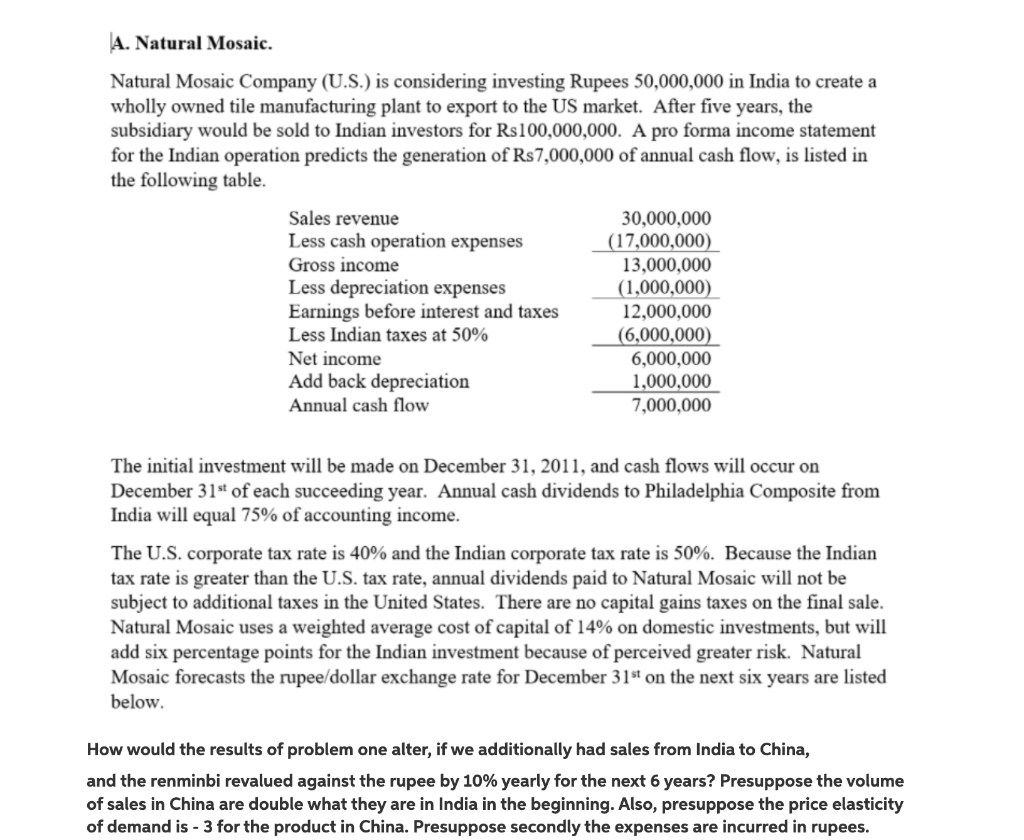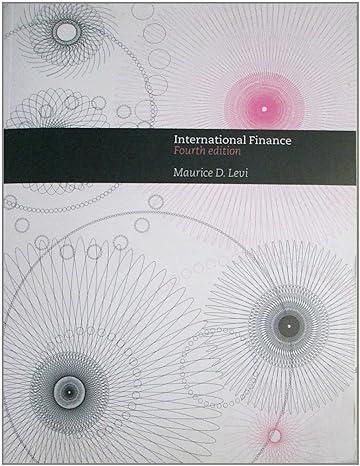Please type up detailed response and go into specifics
Question is at the bottom:

A. Natural Mosaic. Natural Mosaic Company (U.S.) is considering investing Rupees 50,000,000 in India to create a wholly owned tile manufacturing plant to export to the US market. After five years, the subsidiary would be sold to Indian investors for Rs100,000,000. A pro forma income statement for the Indian operation predicts the generation of Rs7,000,000 of annual cash flow, is listed in the following table. Sales revenue 30,000,000 Less cash operation expenses (17,000,000) Gross income 13,000,000 Less depreciation expenses (1,000,000) Earnings before interest and taxes 12,000,000 Less Indian taxes at 50% (6,000,000) Net income 6,000,000 Add back depreciation 1,000,000 Annual cash flow 7,000,000 The initial investment will be made on December 31, 2011, and cash flows will occur on December 31st of each succeeding year. Annual cash dividends to Philadelphia Composite from India will equal 75% of accounting income. The U.S. corporate tax rate is 40% and the Indian corporate tax rate is 50%. Because the Indian tax rate is greater than the U.S. tax rate, annual dividends paid to Natural Mosaic will not be subject to additional taxes in the United States. There are no capital gains taxes on the final sale. Natural Mosaic uses a weighted average cost of capital of 14% on domestic investments, but will add six percentage points for the Indian investment because of perceived greater risk. Natural Mosaic forecasts the rupee/dollar exchange rate for December 31st on the next six years are listed below How would the results of problem one alter, if we additionally had sales from India to China, and the renminbi revalued against the rupee by 10% yearly for the next 6 years? Presuppose the volume of sales in China are double what they are in India in the beginning. Also, presuppose the price elasticity of demand is - 3 for the product in China. Presuppose secondly the expenses are incurred in rupees. A. Natural Mosaic. Natural Mosaic Company (U.S.) is considering investing Rupees 50,000,000 in India to create a wholly owned tile manufacturing plant to export to the US market. After five years, the subsidiary would be sold to Indian investors for Rs100,000,000. A pro forma income statement for the Indian operation predicts the generation of Rs7,000,000 of annual cash flow, is listed in the following table. Sales revenue 30,000,000 Less cash operation expenses (17,000,000) Gross income 13,000,000 Less depreciation expenses (1,000,000) Earnings before interest and taxes 12,000,000 Less Indian taxes at 50% (6,000,000) Net income 6,000,000 Add back depreciation 1,000,000 Annual cash flow 7,000,000 The initial investment will be made on December 31, 2011, and cash flows will occur on December 31st of each succeeding year. Annual cash dividends to Philadelphia Composite from India will equal 75% of accounting income. The U.S. corporate tax rate is 40% and the Indian corporate tax rate is 50%. Because the Indian tax rate is greater than the U.S. tax rate, annual dividends paid to Natural Mosaic will not be subject to additional taxes in the United States. There are no capital gains taxes on the final sale. Natural Mosaic uses a weighted average cost of capital of 14% on domestic investments, but will add six percentage points for the Indian investment because of perceived greater risk. Natural Mosaic forecasts the rupee/dollar exchange rate for December 31st on the next six years are listed below How would the results of problem one alter, if we additionally had sales from India to China, and the renminbi revalued against the rupee by 10% yearly for the next 6 years? Presuppose the volume of sales in China are double what they are in India in the beginning. Also, presuppose the price elasticity of demand is - 3 for the product in China. Presuppose secondly the expenses are incurred in rupees







